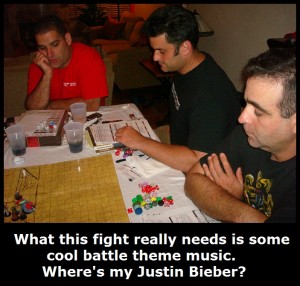 There are plenty of issues out there that divide people – be it race, religion, politics or sexuality. We all have our own beliefs and experiences with these subjects. They have shaped our ideals and are part of our identity. It is only natural that something so intrinsically personal has been the cause of wars throughout history. We want to defend what is important to us. But, we want to keep our wars strictly In-Game. So, how do you introduce such elements without starting a conflict of ideology? Honesty, sensitivity and maturity are your main ingredients in the recipe. And like any recipe, if you leave one of them out, you are going to have a mess.
There are plenty of issues out there that divide people – be it race, religion, politics or sexuality. We all have our own beliefs and experiences with these subjects. They have shaped our ideals and are part of our identity. It is only natural that something so intrinsically personal has been the cause of wars throughout history. We want to defend what is important to us. But, we want to keep our wars strictly In-Game. So, how do you introduce such elements without starting a conflict of ideology? Honesty, sensitivity and maturity are your main ingredients in the recipe. And like any recipe, if you leave one of them out, you are going to have a mess.
To successfully incorporate such elements in your game, the key to avoiding unnecessary discomfort to your players is, first and foremost, being completely open with them. If you know in advance that you are going to present such elements into your game, you owe it to your players to tell them so they can decide for themselves if they wish to delve into those themes.
If you know your game is going to regularly be touching on such subjects, one thing you can do is to create a player comfort survey. Write up a number of elements you are planning to bring up in the game and ask the players to rate on a scale from 1-5 how comfortable they are with it. As an example of this, my husband and I had planned to run a psychological horror game that was going to involve themes involving extreme violence, torture, abuse and rape. Obviously these are “hot button” issues that not everyone is going to be comfortable with. We made sure to include questions distinguishing comfort of one’s character witnessing the experience vs. being involved in the experience. It’s important to include both, because while players may be okay with the themes being presented in the game, they may not feel comfortable with those themes being personally directed at their character.
Another useful aspect of using a survey in this way is that it offers your players a non-confrontational way for them to give feedback on issues they may not wish to discuss or go into detail about. Only ask them to assign numbers. You are not asking them to elaborate on why they are uncomfortable about the issue, which should hopefully alleviate some of their anxiety and help give your players a sense of security.
Something to keep in mind is that the more you load your game with these subjects, the less players you may be able to draw in. You have to be aware from the start that people have their own sensitivities, and so pressuring them to play in something they are not comfortable with is simply not a way to conduct yourself. If a player loses interest in the game based on these subjects, try to be understanding and supportive, and either alter the game to take out these elements, or allow them to quietly bow out. Understand that certain themes are not for everyone. That’s just the way things are.
For the players who do stick through the game, be sure to continue to proceed with some level of caution. They may be up for exploring these themes, but that doesn’t mean they will necessarily continue to feel comfortable about its presence in the game if they feel you are being too gratuitous or otherwise insensitive about the issue. To stay on track, you may wish to ask for feedback from your players after sessions. Encourage them to contact you if they start to become uncomfortable with the game’s content. Maintaining this open line of communication from start to finish shows your players that you care and will hopefully help reduce unnecessary discomfort.

Interesting topic. I can recall several moments (in the last 8 years of gaming) where the either the GM or a player introduced something to the game that made the rest of the group kind stop for a second. Torturing the bad guys never once even came up as a blip on the radar, that’s everyday practice!
Well said, keeping your players informed of (in general) what is planned and getting feedback from them on what is too much is key for boundary pushing. As in any social situation, communication is key.
Very nice post. Communication is often the best way to handle these things, and telling the players right up front what you want to cover in the game can prevent misunderstandings later. What you are talking about can also be used for any game, judging the players interest levels in things.